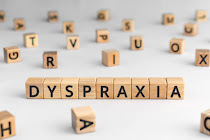Your basket is currently empty!
Here at F&B Digital Therapy, we have lived experience of Neurodivergence. Our therapist Faye was diagnosed with Dyspraxia later in life. Dyspraxia is often a misunderstood condition, so we hope to shed some light on the symptoms and share a little bit of personal lived experience. If you’d like to learn more, head on over to the Dyspraxia Foundation https://dyspraxiafoundation.org.uk/.
What is Dyspraxia?
Dyspraxia, also known as Developmental Coordination Disorder (DCD) is a disorder which comes under the neurodivergence umbrella. It is thought to be a problem with the way messages are sent between your brain and body and results in problems with movement and coordination. People often think of Dyspraxia as people being clumsy but it is much more than that!
It is thought that around 10% of the population has dyspraxia at varying degrees of severity. There is often an overlap with other conditions such as ADHD, Autism and Dyslexia. You are born with dyspraxia and don’t acquire it.
How is Dyspraxia Diagnosed?
In childhood, Dyspraxia can be diagnosed by speaking to your GP, Health Visitor or school who can arrange the appropriate assessments. In adulthood, it can be more tricky. Personally, I was given the diagnosis by an educational psychologist working from my university. I had suspected for many years that I had dyspraxia and whilst studying for a professional degree in my 30s, I decided to ask for an assessment. The assessment itself took place at university and took several hours. I was asked to do a range of different tasks throughout this time.
What are common symptoms in Dyspraxia?
As mentioned above, Dyspraxia can cause problems with movement and coordination and these are often the symptoms people know more about. Personally, I have always struggled with certain tasks growing up. I was always picked last in P.E because I never mastered catching or throwing. I also struggled with putting too much pressure on my pencil causing them to break and my handwriting was poor, meaning I was one of the last to ‘graduate’ to a pen in primary school. Using cutlery, learning to ride a bike or tie shoelaces can also be common problems people might notice as children but often continue into adulthood.
Poor Spatial Awareness – People with Dyspraxia can struggle with knowing where their body is in relation to other people or things. This can result in tripping or spilling things or difficulties with learning to drive or park cars.
Inadequate Sense of Direction – My Sat nav is my best friend in the car and I even use it sometimes when walking to get to my destination. Difficulties distinguishing left from right are common and I often find reversing directions difficult. For example, if I walked into a shop from the left, I would get mixed up which way to turn when I leave. I can also struggle to remember places I have been to many times before, not recognising roads or buildings.
Sensory Problems – Some people with Dyspraxia may be oversensitive to light, noise, or touch. Personally, loud noises can feel as though they hurt.
Executive Functioning refers to a set of skills which Dyspraxic people can struggle with:
– Working memory. It is no secret that my short term memory is appalling. If I don’t write something down or do it straight away, it won’t happen. We all have those moments where we walk into a room and forget what we went in there for, but with Dyspraxia, this is a daily occurrence. It also leads to losing things quite often which can impact on leaving the house on time.
– Time Management. Understanding the concept of time can be an issue sometimes, for example, overestimating or underestimating how long something will take. It often leads to me being super early or late.
– Task initiating. The ability to start or stop tasks without procrastination. Motivation has always been a struggle for me and daily tasks can cause me to feel tired
– Impulse Control. If I get an idea in my head, I want to do it now! This can lead to no planning or preparation and a poor end result.
– Planning and Prioritising/Organisation.
– Emotional Control.
Social Problems – Many Dyspraxic people struggle with social situations for a variety of reasons. They may struggle to understand social cues, jokes or sarcasm and can take things literally. They may struggle to organise their thoughts and speech resulting in talking other others or talking too much or aimlessly. They may struggle to hear people in a crowd or noisy environment. They may struggle to adapt to new situations or environments.
Other symptoms may include:
– Being messy/struggling to keep their space tidy
– Difficulty with Focus and Concentration
– Daydreams often
– Easily Distracted
– Struggles to follow instructions
– Can struggle to manage their emotions, becoming easily frustrated, anxious or overwhelmed.
– Poor posture, flat feet and poor muscle tone e.g weak arms or short hamstrings.
Why is diagnosis Important?
A lot of people are seeking diagnosis later in life, and whilst some may question the helpfulness of this, I believe that living your life with an undiagnosed condition can cause problems of its own. Given the myriad of difficulties that Dyspraxia can cause, without a diagnosis, people can often be labelled with unhelpful descriptions. Growing up, I believed I was:
– Clumsy
– Forgetful
– Messy
– Lazy
– Stupid/Not clever enough
– Not trying hard enough
– Not being careful
I now know that I have accomplished so much, despite these difficulties. Dyspraxia, like all neurodivergence, can also bring strengths too! I have a creative brain which allows me to see things outside of the box. I regularly come up with ideas and solutions and am passionate about things I care about.
How can therapy help Dyspraxia?
CBT can’t get rid of Dyspraxia, but it can help you to deal with any anxieties, confidence issues or self-esteem problems which have arose due to your condition. F&B Digital Therapy are passionate about self-esteem work and hope we can help you to recognise your strengths and wonderful differences. Find out more about what CBT is here.

We also provide text therapy, which may be more suited to some people with Dyspraxia.
If you would like to get started with F&B Digital Therapy, book an appointment now!

